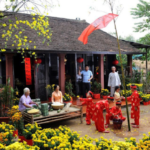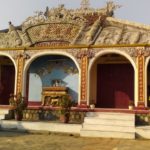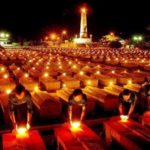Hòn non bộ is not just a decorative piece in a house, but it also holds a very important meaning in our family. Today, we will introduce to you in detail the meaning and how to arrange Hòn non bộ according to Feng Shui!
1. Explore Hòn non bộ
What is Hòn non bộ?
Hòn non bộ is understood as an art of constructing, arranging, and miniaturizing to bring large natural mountain models into the garden, or can be called “giả sơn”. The art of Hòn non bộ in Vietnam appeared during the reign of King Le Dai Hanh and has developed to the present day, becoming an important part of landscape construction.
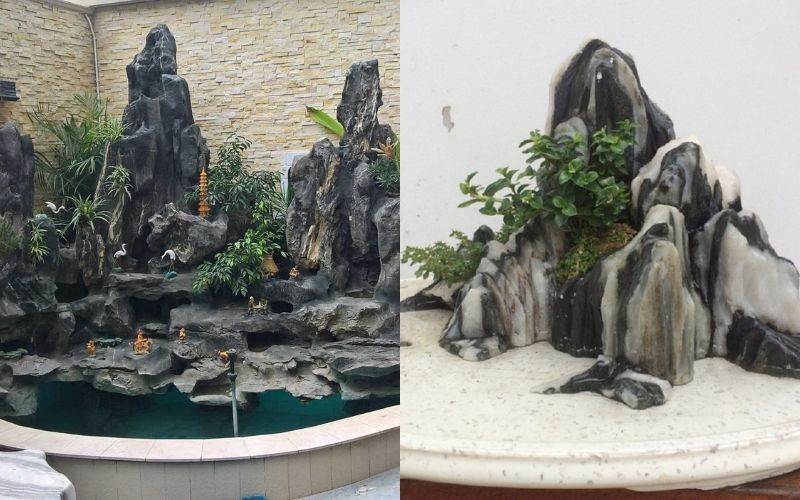 What is Hòn non bộ?
What is Hòn non bộ?
Classification of Hòn non bộ
Hòn non bộ is made from main materials such as stone, soil, and sand. Each type of Hòn non bộ, though helping viewers feel the wild and authentic beauty of the fake mountains, will still have its own characteristics and arrangement methods. Currently, there are two common types of Hòn non bộ:
- Dry Hòn non bộ: Made from pebbles and stones, often with many potted plants, and usually placed indoors.
- Water Hòn non bộ: Also made from the above materials but with additional waterfalls, fish ponds, and usually placed outdoors because, according to Feng Shui concepts, Hòn non bộ is the intersection of heaven and earth, sun, and wind.
Feng Shui Meaning of Hòn non bộ
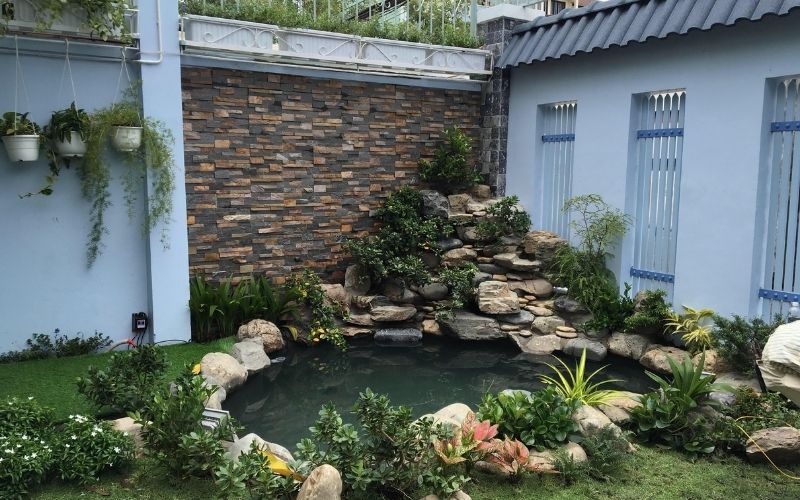 Feng Shui Meaning of Hòn non bộ
Feng Shui Meaning of Hòn non bộ
As mentioned above, Hòn non bộ can be considered as an artistic arrangement of miniaturized models of large natural mountains and rocks. In addition, Hòn non bộ also has the following specific meanings:
- Feng Shui element: Hòn non bộ has long been considered a Feng Shui item that can match almost all birth elements and bring a lot of fortune and luck to the owner.
- Aesthetic element: This will be a refined hobby for those who love the natural, wild beauty of mountains and forests because Hòn non bộ will make your space much more vibrant.
- Air balancing element: In addition to the above elements, because there are many plants in the model, Hòn non bộ can also help purify the air very effectively, making the air around your house fresher.
How to Choose Hòn non bộ According to Your Birth Element
To maximize the Feng Shui effect, you should pay attention to arranging Hòn non bộ to match your birth element, specifically as follows:
Hòn non bộ for People with the Metal Birth Element
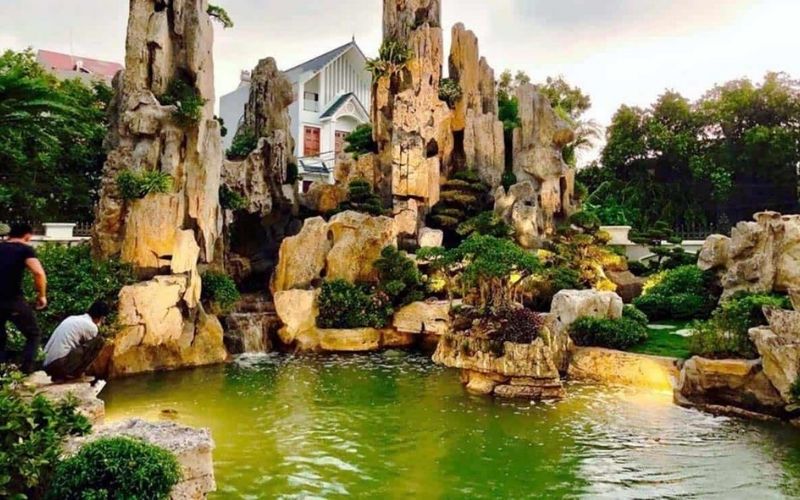 Hòn non bộ for People with the Metal Birth Element
Hòn non bộ for People with the Metal Birth Element
According to Feng Shui, people with the Metal birth element are usually straightforward, strong, and decisive but sometimes a bit conservative. In the concept of the five elements’ mutual generation, Earth generates Metal, so Hòn non bộ made from materials such as soil and stone will help the owner increase their positive energy.
- Feng Shui number: 2, 5, 6, 7, 8. Usually, odd numbers are chosen, and the number 7 is avoided, so Hòn non bộ will look best with 5 mountains in the form of Ngu Hanh Son.
- Feng Shui color: Decorative items in Hòn non bộ should be in yellow, silver-white, and gray, and colors such as red and pink should be avoided.
- Feng Shui direction: The West and North directions will be the “great luck and great wealth” directions, helping people with the Metal birth element to have more luck, money, and prosperity.
Hòn non bộ for People with the Fire Birth Element
 Hòn non bộ for People with the Fire Birth Element
Hòn non bộ for People with the Fire Birth Element
People with the Fire birth element often have a passionate personality, are very cheerful but sometimes a bit hot-tempered. In addition, because Wood generates Fire, if Hòn non bộ has many green trees, it will be very suitable to restrain the anger of people with this birth element.
- Feng Shui number: Hòn non bộ with 3 mountains will be very suitable for people with the Fire birth element.
- Feng Shui color: Decorative items in Hòn non bộ should be in green, red, pink, or purple.
- Feng Shui direction: The South, Southwest, and Northeast directions will help the family of people with the Fire birth element to be peaceful, their work to go smoothly, and their career to be successful.
Hòn non bộ for People with the Wood Birth Element
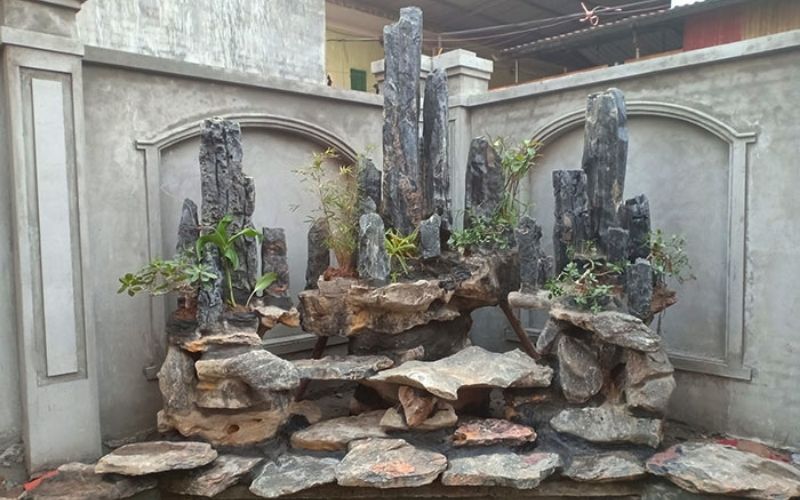 Hòn non bộ for People with the Wood Birth Element
Hòn non bộ for People with the Wood Birth Element
According to the concept of the five elements’ mutual generation, Water generates Wood. Therefore, in addition to having many green trees, Hòn non bộ with flowing water such as waterfalls and ponds will be very suitable for people with this birth element, helping their family to have more health, wealth, and peace.
Feng Shui number: The number of mountains in Hòn non bộ should be 3.
- Feng Shui color: When choosing decorative items, people with the Wood birth element should prioritize items in black, dark blue, green, and dark green.
- Feng Shui direction: Hòn non bộ should be placed in the East or Southeast direction to help attract more fortune and positive energy for the owner.
Hòn non bộ for People with the Water Birth Element
 Hòn non bộ for People with the Water Birth Element
Hòn non bộ for People with the Water Birth Element
Water is the birth element of this owner, so they can choose to plant trees such as milennium pine, peace lily, green heart, and lucky bamboo, as well as build additional items to help their life become more fulfilling and full of happiness. In addition, the number of fish kept in Hòn non bộ also affects the family’s luck.
- Feng Shui number: The number of mountains in Hòn non bộ should be 1 or 5.
- Feng Shui color: Decorative items in Hòn non bộ should be in black, light blue, white, or metallic colors.
- Feng Shui direction: People with the Water birth element should place Hòn non bộ in the North, Northeast, West, or Northwest direction to have more positive energy and fortune.
Hòn non bộ for People with the Earth Birth Element
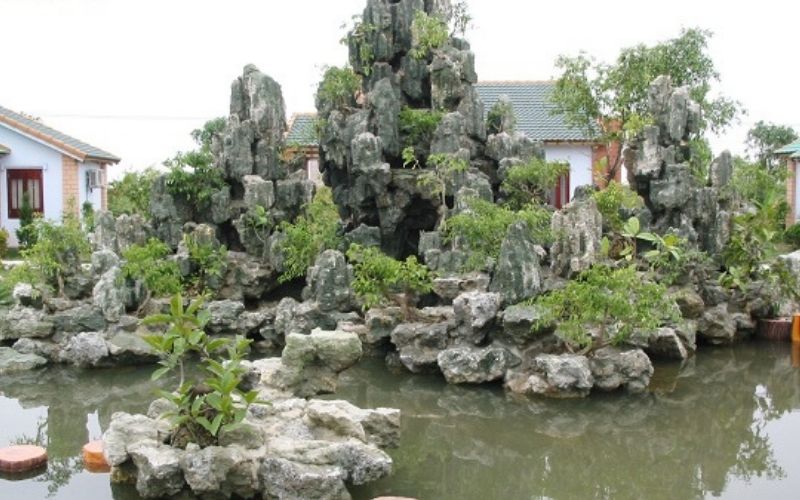 Hòn non bộ for People with the Earth Birth Element
Hòn non bộ for People with the Earth Birth Element
People with the Earth birth element often have a gentle and honest personality, so they are often taken advantage of. Therefore, items related to earth, sand, or pottery will bring good luck to people with this birth element.
- Feng Shui number: The number of mountains in Hòn non bộ should be 5 or 9. The owner can choose the suitable number of mountains but must absolutely not build with an even number of mountains.
- Feng Shui color: People with the Earth birth element should choose decorative items in yellow, red, pink, orange, or purple for their Hòn non bộ.
- Feng Shui direction: Hòn non bộ should be placed in the Northeast or Southwest direction to bring good luck and success to people with the Earth birth element.
2. Popular Mountain Forms in Hòn non bộ
Single Peak Form
As the name suggests, this mountain form only has one peak without any surrounding subordinate peaks, hills, or mounds. Hòn non bộ built in this form must be tall, rugged, and have a sharp peak to fully express the meaning of the single peak form.
The single peak form conveys the meaning of majesty, uniqueness, pride, and haughtiness.
Twin Peaks Form
The twin peaks form has two peaks standing together, but this form is not common. In Feng Shui, even numbers of peaks create opposition and bring negative energy.
Multiple Peaks Form
This is a popular form in Hòn non bộ in garden landscapes, where there is a lot of space. With a group of small mountains combined to create a grand multiple peaks form, the mountains can be of equal height or vary in height to create a harmonious and beautiful effect.
However, there will always be one main peak that is higher than the other subordinate peaks.
Strange Peaks Form
The strange peaks form is simply understood as a large mountain standing apart from other small mountains. This is a combination of the multiple peaks form and the single peak form, bringing strangeness, mystery, and creating interest for the viewer.
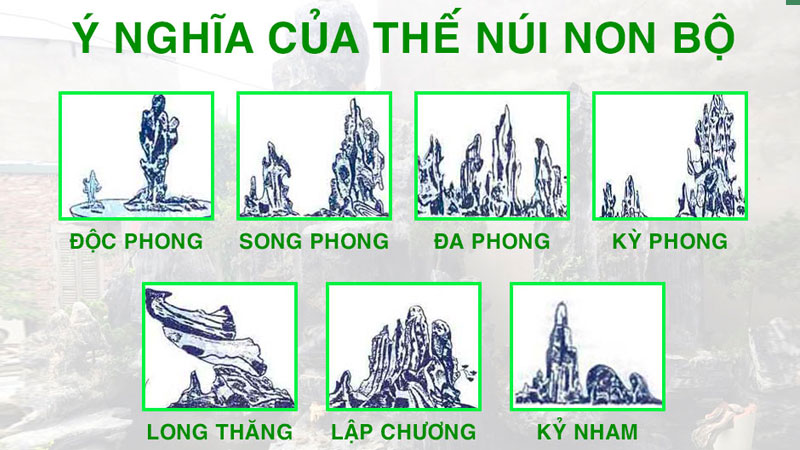 Popular Mountain Forms in Hòn non bộ
Popular Mountain Forms in Hòn non bộ
Ridge Form
The ridge form includes a group of low mountains with round, rather than pointed, peaks.
This mountain form brings a gentle, peaceful, and comfortable atmosphere with elements such as a gurgling waterfall, a fishing old man, and a cowherd boy.
Establishment Form
This landscape will include mountains that are both high and spread out, with flat areas and rugged, bumpy areas, creating a sense of instability, so it is less favored.
Dragon Rising Form
Dragon Rising is a Sino-Vietnamese term, meaning a mountain form that tilts towards the morning sun, expressing strength and a refusal to yield to difficulties and obstacles.
Strange Rocks Form
The strange rocks form is a unique mountain form, depending on the creativity and imagination of the viewer for their own interpretation.
However, this mountain form is difficult to arrange, and if there is any intervention such as carving, it will lose the naturalness and interest of Hòn non bộ. Therefore, you can only achieve this mountain form if you collect a strangely shaped rock to place in the landscape.
3. Notes on Building Hòn non bộ to Avoid
- You should avoid building Hòn non bộ with an even number of peaks and instead opt for odd numbers such as 3, 5, 7, etc. because even numbers are associated with the underworld and remind people of the deceased, which is not good for positive energy.
- One taboo is to avoid creating a hole in the middle of the mountain when building the form because it affects the aesthetics and implies an empty house, seriously affecting Feng Shui, and causing money to dissipate.
- Avoid building large, round, and deep holes because they resemble the eyes of demons, creating a feeling that they are always staring into the house.
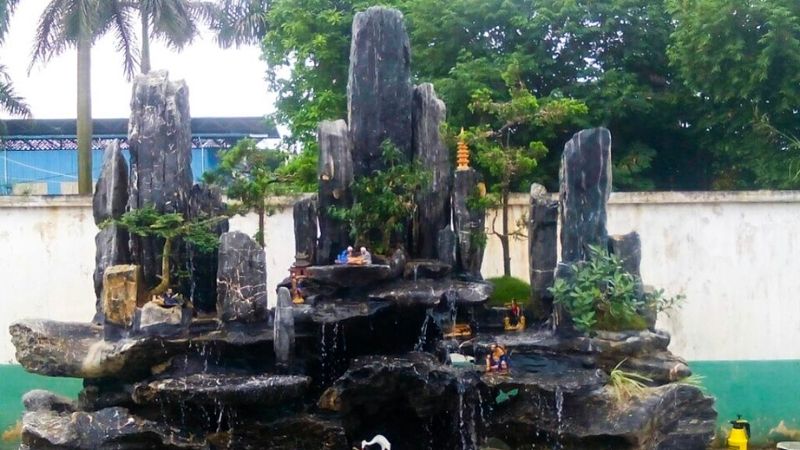 Notes on Building Hòn non bộ to Avoid
Notes on Building Hòn non bộ to Avoid
- Avoid building tall and overly sharp mountains because they resemble spears and halberds, bringing bad luck and cutting off fortune and positive energy in the house.
- The owner should choose Hòn non bộ with both low and high mountains and avoid mountains that are evenly spaced and of the same height. This represents respect for elders, respect for parents, and creates unity among family members.
- You should only use one type of stone when crafting Hòn non bộ because mixing different types of stones will detract from the purity and unity of Hòn non bộ. Do not take stones from the mountains to build with because they carry negative energy.
4. Placement and Arrangement of Hòn non bộ
Do Not Place Hòn non bộ on the Top Floor of the House
According to folk beliefs, Hòn non bộ is a high mountain, and below the mountain is the underworld. Therefore, when you place the mountain on the top floor, it is understood that the floor below the mountain will be a place with negative energy, affecting positive energy, fortune, and the health of the family.
<
Explore 12 Amazing Destinations for Biking Trips
Unlock Vietnam in a brand new way with an exciting biking tour! Discover the stunning beauty of the country with Dien May XANH’s top 12 must-see destinations. From sweeping plains to clear blue beaches and mountainous vistas – experience all the sights with your own personal cycling tour. Find your ideal route and set out for an adventure today!
4 Tips for Making Medical Declarations Online with Phones and Computers
With the COVID-19 epidemic posing a complex situation for all Vietnamese citizens, it is their responsibility to make a medical declaration. If you are unsure of how to do it, Dien May XANH is here to help with 4 methods to make a medical declaration online on your smart phone or computer.
























